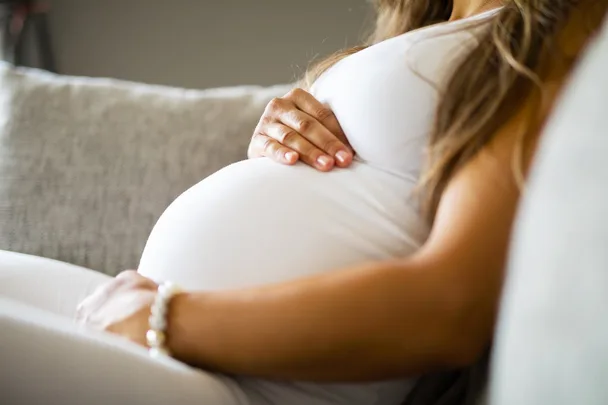Many factors contribute to fertility, from lifestyle to diet and genetics and everything in between. Struggling to fall pregnant is a hugely emotional and personal experience and while there is no miracle answer, there are science-backed dietary and lifestyle tweaks you can make that can be game-changing. We talk to three natural fertility experts to get the low-down on how to boost your fertility, the natural way.
The Naturopath
Zoe Dent is a passionate holistic nutrition and herbal medicine advocate who believes strongly in the correlation between what we eat and fertility.
“Food can have a significant effect on fertility, with diets high in unsaturated fats, whole grains, vegetables, and fish associated with improved fertility outcomes,’’ she says.
“Whilst diets high in saturated fats and sugar have been associated with poorer fertility outcomes in both women and men.”
Zoe cites the Nurses’ Health Study II, a large prospective cohort of women who had the highest intake of a “fertility diet”, which comprised of plant protein from vegetable sources, full-fat dairy foods, iron, and monounsaturated fats were found to have a 66 per cent lower risk of infertility related ovulatory disorders, and a 27 per cent lower risk of infertility due to other causes compared to women with the lowest intake of this diet pattern.
Her tips for eating for fertility include:
Eat organic
“Use organic produce where you can; particularly when eating animal products such as dairy, beef, eggs and chicken to ensure you are consuming optimal nutrients without the endocrine-disrupting pesticides and antibiotic residue,’’ she says.
Plenty of protein
“Aim for four serves of protein daily; meat, chicken, fish, legumes, nuts and seeds, quinoa, eggs, gelatin and dairy.”
Seek out antioxidant-rich foods
“Make sure you consume antioxidant-rich foods as they can protect the health of female oocytes’ (eggs),’’ she says.
“I recommend aiming for two cups of veggies at every meal – look for a coloured rainbow, but especially dark leafy greens as they are high in fertility nutrients such as folate, iron, calcium, Vitamin A and manganese.
Good fats
“Omega-3s are imperative to help regulate hormones, increase cervical mucus, promote ovulation, and improve blood flow to the reproductive organs, so opt for sardines, mackerel, flaxeed, chia seeds and walnuts,’’ she says.
Folate
“Foods rich in folate (B9) are also crucial for the health of your eggs which include citrus fruits, beans, rice, and leafy green vegetables.”
The Clinical Nutritionist
When you ask clinical nutritionist and psychologist Kellie Montgomery to talk about her natural fertility advice, she is cautious in her response.
“Infertility is such a complex issue, but what we do know is what we eat critically impacts all stages of the fertility and conception process,’’ she says.
“The nutrients from our food provide the building blocks for our reproductive hormones and support the function of our reproductive tissues. I’m talking about egg and sperm quality, supporting a rich endometrial lining, plus all our hormones required for ovulation and the early implantation and pregnancy phase.”
When a patient comes to her with fertility struggles Kellie’s advice varies, however the process is the same.
“My advice is always dependent on the individual sitting in front of me. If they haven’t already been tested by their GP or IVF specialist, I’ll send women for iron studies, thyroid panel, Vitamin D, hormone panel and some basic gene testing (looking for mutations in the MTHFR gene particularly),’’ she says.
“Once we’ve investigated what’s causing the fertility challenge, we use nutritional therapy to address it and to support the healthiest ovulation that we can. This includes looking at specific nutrients that support egg quality, ovulation, implantation, and healthy cellular growth.
“CoQ10 is a nutrient I often prescribe; it’s particularly important to protect the quality and maturation of the egg, and there is some recent research suggesting that supplementation may improve fertility outcomes in women undergoing assisted reproductive technology. Zinc is another top nutrient that I prescribe for fertility challenges.”
Kellie says the most important rule of thumb is to eat a varied diet focussed on wholefoods, with plenty of plants to support healthy ovulation.
Kellie’s sample daily food plan for fertility:
Breakfast
Greek yoghurt with chopped mango and berries, topped with cinnamon a couple of tablespoons each of chopped brazil nuts, hemp seeds and chia seeds
Lunch
Roasted vegetable frittata with a rocket, chickpea and avocado side salad
Dinner
Steamed mackerel with ginger and garlic, roasted white and sweet potato and steamed broccoli and Brussel sprouts tossed in olive oil
Snacks
Celery sticks with almond butter and a green smoothie
The Acupuncturist
Eva Rose is an acupuncturist and naturopath specialising in hormones, fertility and pregnancy, and she says, not surprisingly, stress plays the most havoc with her patient’s fertility journeys.
“Our bodies are not designed to endure the constant ‘on-the-go’ stressful lifestyle that the majority of us are currently living, and it is especially not favourable for conception,’’ Eva says.
“Long-term stress can cause havoc to our reproductive hormones resulting in delayed or absent ovulation, reduced blood flow to the uterus and inadequate endometrial lining for successful implantation, as well as deterioration in oocyte (egg) quality.”
Eva acknowledges that it’s difficult and unrealistic to leave a high-stress job, but her best advice is to do whatever it takes (within reason!) to stay calm and positive. For some people, this is focussing on accessible behaviour change like swapping HIIT classes for yoga, and for others, it might be taking extra time out to nurture their emotional needs. She is also careful to accentuate there is no miracle solution to falling pregnant.
“Acupuncturists offer a holistic approach to supporting fertility by investigating many aspects of your health and wellbeing. This may include working to correct energetic imbalances within the body that are affecting physiological functions, supporting relaxation and emotional health as well as offering dietary and lifestyle advice for your individual constitution,’’ she says.
“Acupuncture has a regulating effect on hormones within the body and can increase blood circulation to the uterus which is valuable for fertility and conception.”
It’s important to remember that fertility is incredibly complex and can be affected by a number of factors. If you are needing more information or want to speak to a healthcare professional, you can reach the Pregnancy, Birth And Baby Hotline on 1800 882 436.
Jenny Ringland and Erica Watson, of Green + Simple, are marie claire’s new sustainability experts. Each week they’ll be posting weekly stories on the best green, clean fashion, beauty and lifestyle products, as well as interviewing industry game-changers and experts. Learn more here.










